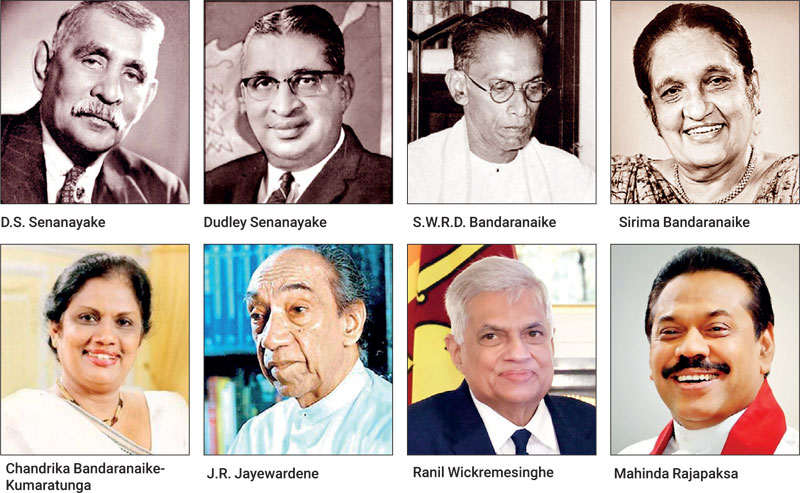Nepotism: Historical perspective and lost opportunities – By Dr Nimal Edirisinghe

Source : ft
 Nepotism or family bandysm can be defined as patronage bestowed or favouritism shown on the basis of family relationship, as in business and politics. Nepotism is by no means confined to Sri Lankan politics, but the extended family favouritism has taken it to a whole new level.
Nepotism or family bandysm can be defined as patronage bestowed or favouritism shown on the basis of family relationship, as in business and politics. Nepotism is by no means confined to Sri Lankan politics, but the extended family favouritism has taken it to a whole new level.
Historical perspective
With the independence from British rule Sri Lankan political dynasties flourished to new heights. Though the democratic electoral mechanism is meant to cater for electing capable politicians, this phenomenon appears to be unrealistic in South and East Asian politics. Major reason could be the immaturity of the electorate to understand the criteria for electing their representatives.
After gaining independence in 1948, Sri Lanka had broad based two political camps, one being United National Party (UNP) and the other being the left leaning parties such as Communist Party (CP), Lanka Sama Samaja Party (LSSP) and Mahajana Eksath Peramuna (MEP), etc. UNP led by D.S. Senanayake appeared to have favoured his son Dudley over imminent and accomplished politician S.W.R.D. Bandaranaike. Hardly any doubt existed that the calibre of SWRD would have taken the UNP on the progressive path if he was given the opportunity to lead the party. Denial of the merited place for SWRD led to unintended consequences where SWRD leaving the UNP and forming Sri Lanka Freedom Party (SLFP) with mostly left leaning politicians. Though SWRD capitalised on the prevailing societal and political pulse crafted by leftist parties in the previous few decades it would have been a different approach SWRD would have taken if he was given the opportunity to lead the UNP.
Consequences
After winning the historical election, SWRD embarked on a nationalistic agenda under SLFP to become a formidable party against the UNP. Few of the reform initiatives SWRD was forced to undertake to progress the alliance agenda ended with disastrous consequences resulting in his untimely tragic death. Leadership vacuum created by such settings forced SLFP to run without visionary leadership. If SWRD had the opportunity to lead SLFP for a few more years, the situation would have been much better than what happened in the 1960s as visionary leaders are capable of altering approaches to achieve intended goals such as prosperity for the whole nation.
Mrs Bandaranaike’s limited capabilities forced her to execute a passive leadership style which hardly helped the nation to achieve intended progress compared to economic growth that took place in the South and East Asian regions during this decade. It is understood that only Sri Lanka had a Stock Exchange in these regions at the time of gaining independence, which is one of the symbols of economic prosperity at that time.
While Sri Lanka was embarking on moderate economic initiatives, other countries in the Asian region such as Malaysia, Indonesia and Singapore executed rapid and progressive economic policies backed by visionary leaderships. Instead of nationalising plantations like in Sri Lanka, the Malaysian government elected to buy shares of plantation companies which strategy was capable of reaping benefits of public and private partnerships. While the rest of South and East Asia had rapid progress, Sri Lanka trailed badly and the country’s economic standing in the region gradually deteriorated due to lack of visionary leadership. That means we lost another decade and half while the rest of Asia prospered. No doubt that this was a favourable decade for Sri Lanka to progress its economic agenda given the country was enjoying relative prosperity in the region as well as it enjoyed a comparative social harmony free from interference from adversarial elements to thwart its path to prosperity.
New entrants
Janatha Vimukthi Peramuna (JVP or JJB) was emerging as a third force in Sri Lankan politics in 1990s, but the leadership not only failed to capitalise on this opportunity but also created an environment where any other progressive group wouldn’t become a third force in Sri Lankan politics. Under UPFA, JVP won 39 seats in the 2004 parliamentary election, and this was a great opportunity for them to demonstrate their capacity for effective governance but failed to do so due to creating unnecessary fictions in the coalition and later leaving it. What is most ironic about the JVP’s failure is that it has hardly had any victory to show in two insurrections or in the decades of parliamentary politics that followed. There was little evidence to suggest any new entrants to the JVP leadership, like in other political parties, during the last two decades though they claim to be a progressive force.
State of deterioration
Early 1970s SLFP with the alliance of CP and LSSP embarked on progressive and locally sustainable economic policies that suited the nation when compared with consequences of current open economic policies. Minister Felix Dias Bandaranaike, a close family member of the then PM, became the most powerful member of the administration due to a power struggle that took place within the coalition. Unfortunately, the whole machinery of the regime and the administration became self-destructive after giving an unwarranted authority to a close family member. This also led to weakening of the coalition by its partners and contesting the upcoming election separately. This resulted in the opposition UNP gaining five-sixth majority and thereby enabling them to introduce disastrous constitutional, administrative as well as unhealthy economic policies in which long lasting consequences are experienced by the whole country even today.
With President J.R. Jayewardene winning the election in 1977 through UNP its massive power in the parliament enabled them to introduce new constitution and an election act which led to distorting the electoral level representation and making rooms for unscrupulous elements to grab political power in the country and remain in power for many more years to come. Resulting dictatorial powers enable the leadership to pass legislations such as Provincial Councils Act where 90% of the nation never wanted, but due to pressure from India, and thereby resulting in a needless draining of the country’s financial resources. President Jayewardene chose to groom his nephew, the current President, Ranil Wickremesinghe to lead the UNP and he succeeded the leadership of the UNP after the tragic death of President R. Premadasa.
It was rumoured that President Jayewardene advised his cabinet of ministers not to question the portfolios given to Wickremesinghe at that time. UNP leadership then changed the party’s constitution to permit its leaders to continue to hold party control and this proposition failed to groom charismatic leaders for the party and resulted in splitting it into two camps in the last parliamentary election. Country lost another two decades due to family centric political agendas without a visionary and capable leadership to take the nation forward.
After almost two decades of UNP rule, Chandrika Bandaranaike-Kumaratunga, daughter of Mrs Bandaranaike, assumed the leadership of the SLFP and became the President. The country hardly saw any progress under this leadership which was gifted due to family connections rather than capability for efficient and effective governance that was begging at that time.
With the support of the family members around President Mahinda Rajapaksa skilfully defeated the separatist movement in the country. Geopolitical mindset prevailed against the separatist movement, which never existed in the early stage of the conflict, no doubt helped the Rajapaksa administration to eradicate the separatist movement.
After defeating the separatist movement President Rajapaksa had a great opportunity to implement rapid and progressive economic policies in the country and such opportunities were tainted by massive concentration of family centric governance style. After defeating the separatist movement, the Rajapaksa administration embarked on large-scale and expensive development programs where financial sustainability was grossly ignored.
The period from 1950s to 1960s was an opportunistic period for Sri Lanka to embark on an aggressive development path without the hindrance of adversarial elements which had hidden agendas against the progress of the nation. These forces are now well-equipped to use prevailing social media platforms to twist any progressive initiative and present them as disastrous endeavors.
Way forward
There is clear evidence that the whole country is paying a huge price lately with the introduction of unwise economic policies by the current administration and successive regimes.
India is a good example of charismatic leaders like Narendra Modi, emanating from an average family, with a grand vision for the country without connections to political dynasties leading the country forward. Modi’s visionary leadership and clear understanding of geo-political compulsions no doubt helped him to put the country on a development path despite the presence of a vast and cumbersome socio-political environment across the country. Similar development took place in countries like Malaysia, Singapore and South Korea in the past with visionary leaderships. Even India’s main opposition lately realised that only a capable leadership could challenge the present government in future elections rather than depending on traditional leadership it inherited from political dynasties.
Prevailing electoral system in the country appear to be a major barrier for visionary leaders to enter the parliament as it favours the incumbent members as they have established capable networks for mammoth campaigns necessary for an entire electoral district backed by enormous funding instead of members being elected from a local electoral division which mechanism existed prior to 1978. No actions took place to get rid of the current electoral system though major parties gave many promises in the past and it is unlikely to happen in the near future until there is a possibility of genuine ‘system change’.
Not only did nepotism drag Sri Lanka to the current situation, the attitude of voters favouring a handful of families to lead the country also contributed to the current distressing status of the country. Such settings demonstrate the need for proper and urgent education for voters so that they can exercise their franchise ability to elect capable leaders for the betterment of their nation.
Visionary leadership is the need of the hour and not the family dynasties which failed to address issues faced by the nation during the last seven decades. The cost of family nepotism in politics is that the respective countries are denied the potential through capable leaderships to govern the country and thereby ensure the prosperity of the nation.
Current political formation appears to be similar to the era or political setting we experienced before SWRD leaving the UNP since the current governance of the country is a force led by both UNP and SLFP (SLPP). There is a path being created for progressive political parties or forces to use this rare opportunity to collaborate to achieve an honourable and effective governance in the country even at this late stage. The battered nation enthusiastically anticipating to realise such a scenario or a miracle, so to speak, that will provide the proper vision and the capacity to rescue the nation from disastrous consequences experienced today.






